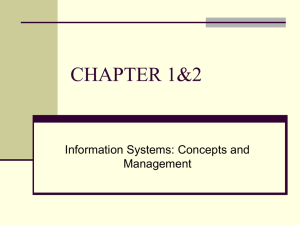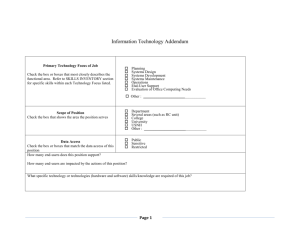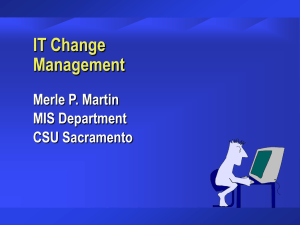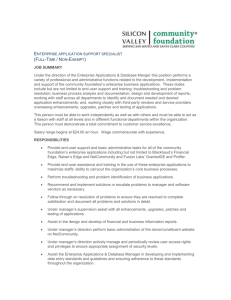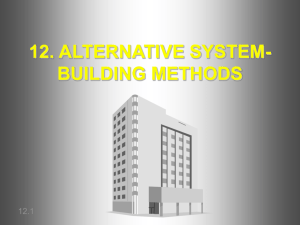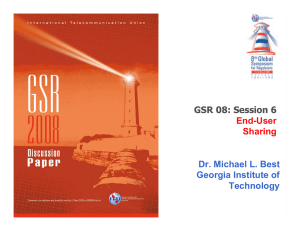End-user Computing Development Model
advertisement
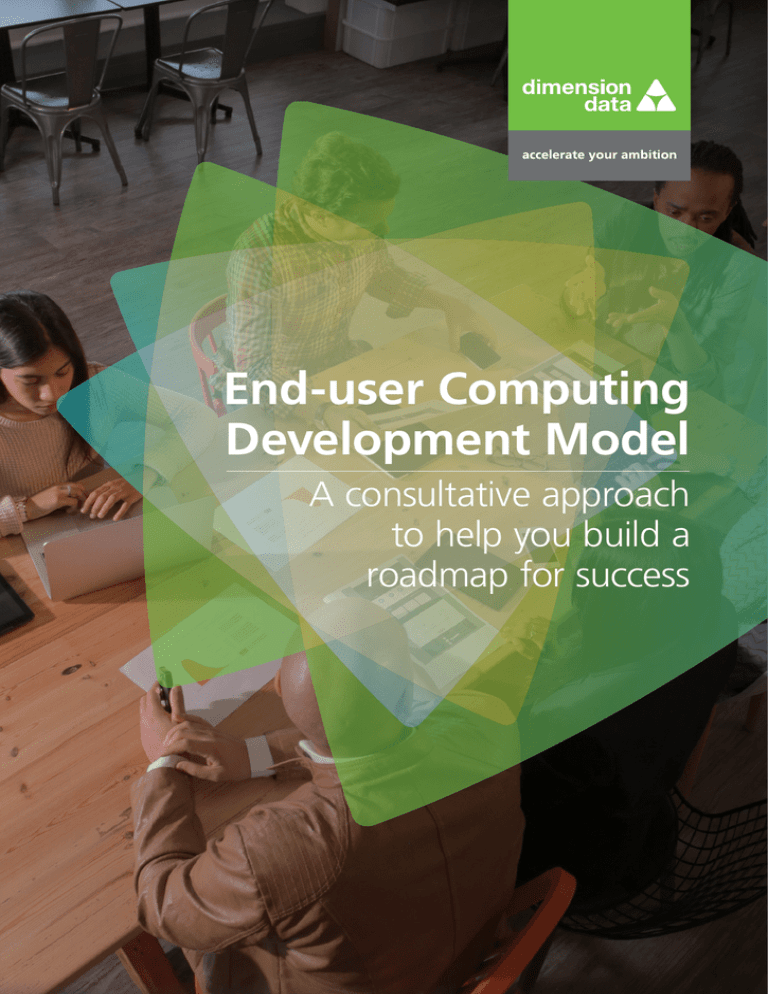
End-user Computing Development Model A consultative approach to help you build a roadmap for success EUCDM | A consultative approach to help you build a roadmap for success The current revolution in end-user computing is permanently changing today’s workplace, promising greater flexibility, productivity enhancements, staff morale improvements, and cost savings. Your business can benefit greatly from these changes. End-user computing is no longer about managing just a laptop or desktop. Today, end-user computing is about supporting user access to services, applications, and data on any device and at any time. These days, end users are using two or three, even four computing devices – all with different capabilities, form factors, operating systems, and security models. In this multi-device world, we can no longer rely on the old ways of managing end users’ devices. To benefit from the transition to user-centric computing, your organisation will have to change its approach to end-user computing. Dimension Data has the tools to help your IT department plan and implement user-centric computing. We brought together the experience we’d gained in helping clients manage the changes brought about by enterprise mobility with our expertise in implementing systems that support and manage next-generation desktops and laptops. Using our tools in a consulting engagement, we can help you answer such questions as: •H ow do you protect your organisation’s data and systems in this new multi-device environment? •H ow do you cut costs when you need to look after new smart devices, as well as laptops and desktops? •H ow do you better support end users so that they can work anywhere and anytime? •W hat projects do you need to put into your budget for the coming years to ensure that you have the systems and services in place to maximise the benefits of the revolution in end-user computing? Dimension Data’s End-user Computing Development Model Our strategic toolset is both practical and pragmatic. It assesses an organisation’s competence and capability in the area of end-user computing against a set of operational and strategic criteria. We review where you are today across six key areas: • users • operations • infrastructure • applications • devices • security We also help you to develop your understanding of where you want to be across the same six areas. By analysing the gap between where you are and where you want to be, we develop a roadmap of projects that you need to undertake to transform how you deliver end-user computing services to your organisation. In addition, we also assist you to plot your current and desired state across the three areas of people, process and technology as they relate to end-user computing. These are key macro areas to consider and analyse when implementing an end-user computing strategy. ‘By analysing the gap between where you are and where you want to be, we develop a roadmap of projects that you need to undertake to transform how you deliver end-user computing services to your organisation.’ •W hat is your roadmap in creating a successful end-user computing strategy and execution plan? CS / GLMKEUC0032 / 12/15 © Copyright Dimension Data 2015 The Model is designed to deliver the following: • improved knowledge – general education about what end-user computing is and approaches to related solutions • an understanding of the impact – exploring the effect of end-user computing on existing infrastructure, operations, the organisation, and business alignment • a clear vision – identifying possible business use cases and describing the organisation’s overall goals and strategy related to end-user computing • a defined ‘as-is’ and ‘to-be’ state – detailing the current state and the desired state to ensure more clarity in terms of the approach • a roadmap – planning a route from the ‘as-is’ to the ‘to-be’ state, including recommendations to get started Our approach The End-user Computing Development Model is a strategic process with a consulting-led, facilitated workshop at its core. It’s delivered in three phases: Discover phase The first step entails gathering information in two ways: • The pre-workshop call is scheduled with key client representatives. We review the workshop agenda, goals, and deliverables, and create a list of attendees from the business and IT. We develop models of the different user types within your organisation, and address general questions to ensure all participants are well prepared and have enough information. • The workshop is the most important step in the delivery of the service. We start with an education session on the business benefits of end-user computing and how they relate to different types of users within your organisation. The consultant leading the workshop will then facilitate a discussion, focusing on the six areas: users, applications, operations, devices, infrastructure, and security. Each area has a number of attributes, shown in Figure 1. The workshop will flow across each of these areas to cover a broad set of topics. Much value is derived from this discussion, which is unique to your organisation. om ser c ng puti End vel ity le -use ur mat -u End r co mpu ti ng m atur ity le Initial | Repeatable | Defined | Managed | Optimised Users Applications Operational excellence Users Experience User Training & Adoption User & Business Benefits User Activities Corporate Social Communications Productivity Workspace Mgmt Application Mgmt Software Licensing Business Enablement Governance Operational Device Delivery Strategy System Monitoring vel Devices Infrastructure Security Device Management Device Support Device Strategy Network Remote Access Architecture Servers Cloud Performance Mangement People Information Fabric Security Policy Technology Fig 1: End-user Computing Development Model framework Construct phase Why Dimension Data? The next steps We analyse the data collected as well as the discussion that took place during the discover phase, and prepare a report. Dimension Data offers a unique blend of capabilities, assets, and experience, which sets us apart from other ICT service providers. We have a strong heritage in systems integration, mature managed services skills, cloud delivery infrastructure and capabilities, and technical expertise across all areas of end-user computing. Our expertise also covers networking, data centres, security, conferencing, visual communication, content and collaboration, and customer interaction. This positions us well to help you determine the most appropriate end-user computing plan for your organisation. Are you considering how to optimise your investment in end-user computing? Recommend phase Following the discover phase and the construct phase, Dimension Data will draw on its expertise in all areas of IT infrastructure. These include enterprise mobility, next-generation desktop management, and business transformation. We can make recommendations on how your organisation can develop its end-user computing programme and what specific actions you can take to ensure its success. We provide these recommendations in the form of a written report and presentation delivered in person during a feedback meeting, which will allow for further discussion. ‘We analyse the data collected as well as the discussion that took place during the discover phase, and prepare a report.’ Dimension Data understands just how critical it is for your organisation to take advantage of this revolution in end-user computing. We believe that we’re uniquely placed to not only help you plan the changes required, but also to implement these changes with innovative solutions. • Contact Dimension Data to find out more about setting up an End-user Computing Development Model workshop. • Ask for a meeting to discuss our End-User Computing Framework so that we can share some of our unique insights with you. • Engage and enlist all the relevant stakeholders and arrange an EndUser Computing Development Model workshop with Dimension Data. We’d welcome the opportunity to discuss how we could assist you with your planning around end-user computing. To set up an appointment, please contact your nearest Dimension Data office. Our consultants have the appropriate technical and commercial credentials to provide you with relevant insights and practical advice. Members of our teams have on average 10 years of ICT infrastructure and consulting experience. We’re confident that we can provide a unique view on end-user computing that no other service provider can deliver. This view blends our consulting approach with our extensive experience in delivering ICT solutions to thousands of satisfied clients. dimensiondata.com Middle East & Africa · Algeria Angola Botswana Congo Burundi Democratic Republic of the Congo Gabon Ghana Kenya Malawi Mauritius Morocco Mozambique Namibia Nigeria Oman Rwanda Saudi Arabia South Africa Tanzania Uganda United Arab Emirates Zambia · · · · · · · · · · · Asia · China Hong Kong India Indonesia Japan Korea Malaysia New Zealand Philippines Singapore Taiwan Thailand Vietnam · · · · · · Australia Europe Australian Capital Territory New South Wales Queensland South Australia Victoria Western Australia Austria Belgium Czech Republic France Germany Hungary Ireland Italy Luxembourg Netherlands Poland Portugal Slovakia Spain Switzerland United Kingdom · · · For contact details in your region please visit dimensiondata.com/globalpresence · · · · · · · · Americas · · Brazil Canada Chile Mexico United States ·
